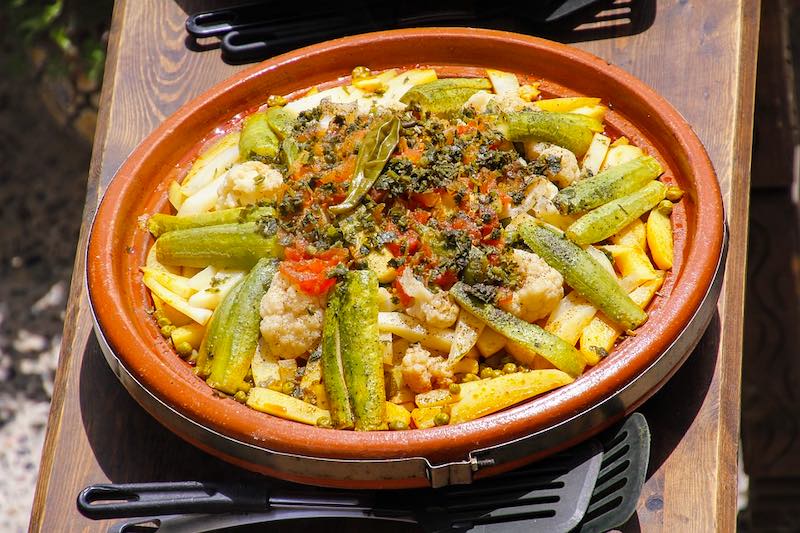Unmissable Moroccan Food Las Vegas Destinations for Gourmets
Unmissable Moroccan Food Las Vegas Destinations for Gourmets
Blog Article
Discover the Flavors of Mediterranean Food: A Trip With Health and Taste
The Mediterranean diet regimen, commemorated not only for its rich tapestry of flavors however additionally for its countless health and wellness benefits, invites a closer exam of its origins and essential active ingredients. With a foundation constructed on fresh vegetables, entire grains, and healthy fats, this food exhibits a harmonious balance in between taste and nourishment. As we explore popular recipes and their dietary advantages, one have to think about exactly how these components add to total well-being. What makes this culinary tradition stand apart among various other dietary patterns? The solution hinges on its distinctive strategy to food and wellness.
Beginnings of Mediterranean Cuisine
Commonly considered as one of the most varied and lively cooking traditions, Mediterranean cuisine has its beginnings deeply rooted in the historical and geographical context of the region. Including the cooking practices of nations surrounding the Mediterranean Sea, such as Italy, Greece, Spain, and Turkey, this food has actually evolved over centuries, affected by an assemblage of societies, profession, and environment.
The old civilizations of the Mediterranean, including the Greeks, Romans, and Phoenicians, played a pivotal function in shaping these cooking methods. The exchange of ingredients and strategies among these cultures cultivated an abundant tapestry of flavors and cooking methods. Location additionally significantly influenced the diet regimen; as an example, seaside locations leaned heavily on seafood, while inland regions emphasized the use of grains, legumes, and animals.
In addition, the region's climate, defined by cozy, dry summer seasons and mild, wet winters, helped with the cultivation of a large variety of fruits, herbs, and veggies. This agricultural bounty contributed to a food that celebrates freshness and seasonality. Therefore, Mediterranean food continues to be not just a reflection of its background yet also a testament to the enduring connection in between food, society, and the environment.
Secret Components and Their Advantages
The rich history of Mediterranean food is mirrored in its key active ingredients, which are essential to creating the area's unique tastes. Olive oil, a foundation of this culinary practice, uses countless health benefits, consisting of heart health and wellness promo and anti-inflammatory buildings. Rich in monounsaturated fats, it acts as a healthier option to hydrogenated fats.
Fresh vegetables such as tomatoes, cucumbers, and bell peppers are celebrated for their vibrant flavors and dietary worth. They are packed with minerals, vitamins, and antioxidants, adding to general wellness and wellness. Legumes, including chickpeas and lentils, supply a durable resource of protein and fiber, making them important for a balanced diet.

Popular Mediterranean Dishes
Fascinating diversity characterizes prominent Mediterranean meals, each providing an unique blend of tastes and social impacts (mediterranean food in las vegas). The region's cooking landscape is abundant with staples such as hummus, a velvety blend of chickpeas, tahini, and garlic, usually offered as a dip with link pita bread. One more classic is the Greek moussaka, a layered casserole of eggplant, ground meat, and béchamel sauce, showcasing the consistency of preferences and structures

Seafood likewise plays a famous function, as seen in recipes like paella from Spain, which integrates rice, saffron, and a variety of seafood, mirroring coastal influences. For those with a craving for sweets, baklava, a pastry constructed from layers of filo dough, nuts, and honey, offers a rich and indulgent experience.
These meals not only exhibit the cooking virtuosity of the Mediterranean however likewise act as a testament to the region's rich history and cultural exchanges.
Health Benefits of Mediterranean Diet Regimen
Countless studies have highlighted the wellness advantages related to the Mediterranean diet, which is characterized by a high consumption of fruits, veggies, entire grains, and healthy and balanced fats, particularly olive oil. This nutritional pattern has been connected to a decreased threat of persistent illness, including cardiovascular disease, diabetes mellitus, and particular types of cancer cells. The focus on plant-based foods offers essential nutrients and anti-oxidants, which add to overall health and wellness.
Research study has shown that adherence to the Mediterranean diet can enhance cardiovascular wellness by decreasing blood stress and cholesterol degrees. In addition, the diet regimen's anti-inflammatory buildings might aid in handling weight and lowering the danger of obesity-related problems. The incorporation of fatty fish, rich in omega-3 fatty acids, sustains brain health and wellness and cognitive feature.
Additionally, the Mediterranean diet regimen promotes a well balanced technique to eating, motivating mindful consumption and social communications throughout meals, which can boost mental wellness and total lifestyle. Its nutrient-dense ingredients and varied tastes make it a pleasurable and lasting dietary option, cultivating long-lasting adherence and countless health benefits (mediterranean food in las vegas). Welcoming this diet regimen may lead to a much more dynamic, healthier lifestyle

Tips for Incorporating Mediterranean Flavors
Including Mediterranean tastes into your meals can change your eating experience while enjoying the diet regimen's health and wellness advantages. To start, use a variety of fresh Related Site herbs and flavors, such as basil, oregano, and rosemary, to elevate the taste of your meals. These aromatic additions not just boost flavor however also improve dietary value.
Following, concentrate on integrating standard ingredients like olive oil, tomatoes, garlic, and lemon. Usage extra virgin olive oil as your main cooking fat, sprinkling it over salads or utilizing it for sautéing vegetables. Additionally, tomatoes can be enjoyed in different types, from fresh salads to roasted meals, giving essential vitamins and antioxidants.
Entire grains, such as bulgur, quinoa, and farro, are also key parts of the Mediterranean diet. Replacement improved grains with these nutrient-dense options to provide fiber and a satisfying structure. Don't neglect to include a range of legumes, such as chickpeas and lentils, which serve as outstanding resources of plant-based protein.
Verdict
The exploration of Mediterranean cuisine reveals a rich tapestry of flavors and dietary benefits that add to total wellness. By highlighting fresh active ingredients, such as olive oil, vegetables, and beans, this cooking custom not just boosts taste however additionally promotes health. Incorporating Mediterranean meals right into everyday diet plans offers many health advantages, making it an engaging choice for those seeking to improve their consuming habits. Welcoming these tastes fosters a much deeper recognition for both cookery and nutritional value.
The Mediterranean diet, celebrated not only for its abundant tapestry of flavors however additionally for its many health benefits, invites a more detailed examination of Related Site its origins and vital active ingredients.Various studies have highlighted the wellness benefits linked with the Mediterranean diet plan, which is identified by a high consumption of fruits, veggies, whole grains, and healthy fats, particularly olive oil.Incorporating Mediterranean tastes right into your meals can change your eating experience while gaining the diet plan's health benefits.The expedition of Mediterranean food exposes a rich tapestry of flavors and dietary advantages that add to overall wellness. Integrating Mediterranean meals into everyday diet regimens supplies various health and wellness advantages, making it an engaging selection for those seeking to improve their eating practices.
Report this page